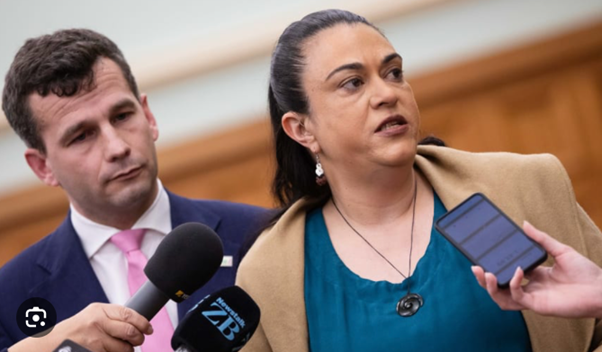Youth
Proposal to repeal section 7AA – a BIG Mistake!
The Waitangi Tribunal has just released its Interim Report on the Minister for Children's proposal to introduce a Bill to Parliament to repeal section 7AA of the Oranga Tamariki Act 1989. The Minister's proposal was outlined in a Cabinet paper lodged with the Cabinet Social Outcomes Committee on 27 March.
Reading the Tribunal report, it's clear that there is no sound reason for repealing section 7AA and that no Bill to enact the repeal should be introduced to Parliament.
For those who don't have time to read the Tribunal Report and who want to know what "all the fuss" is about, we outline below "the basics" of the Minister's proposal to repeal along with the Waitangi Tribunal responses. We begin with an outline of section 7AA of the Oranga Tamariki Act.
Section 7 AA
Section 7AA was enacted into NZ law in 2017 along with a number of other reforms. The broad reform aims were to improve outcomes for children in the statutory care and protection and youth justice systems and reduce inequities between Māori and non-Māori in these systems. (See Expert Panel Final Report Investing in New Zealand’s Children and their Families Investing in Children Programme, December 2015)
Section 7AA guides the Chief Executive (CE) of Oranga Tamariki in its duty to give effect to Te Tiriti of Waitangi, particularly in relation to the Treaty obligations concerning partnership, equity and tino rangatiratanaga. Key provisions are that:
- Oranga Tamariki's practices, policies and procedures must have regard to mana tamaiti (tamariki) and the whakapapa of tamariki Māori and to the whanaungatanga responsibilities of their whānau, hapū, and iwi:
- The CE must seek and respond to invitations to enter strategic partnerships with iwi and Māori organisations.
- The CE must report publicly on the fulfilment of their duties under section 7AA including on the impact of the steps they have taken to improve outcomes for Māori.

What the Minister of Children is proposing and the Tribunal's response
The Minister of Children's proposal for legislation to repeal section 7AA rests on a number of suppositions/proposals outlined below.
Proposal
The problem is that tamariki are being moved from stable and loving placement for cultural reasons rather than because of their needs and interests. Section 7AA is the cause.
Tribunal Response
The Tribunal accepted that sometimes wrong decisions can be made. However, no evidence was presented that section 7AA was to blame. The Tribunal and Oranga Tamariki indicated that wrongful removal of children from placements reflects poor social work practice at an individual level.
It's also relevant here that section 7AA is a Pou or cornerstone of the Oranga Tamariki Act 1989. Unlike Parts 2 and 4 of the Act (provisions to guide care and protection and youth justice interventions), section 7AA doesn't guide decisions about the placement of a child.
Proposal
Section 7AA means that a child's best interests are not prioritised in case decisions and are overrode by a "misplaced" concern with cultural identity.
Tribunal Response
This is not true. In fact, evidence presented to the Tribunal indicated the opposite and that s7AA has resulted in material gains for young people in care.
Oranga Tamariki reported that tamariki now have more opportunity to connect with their culture and develop a sense of belonging. This protects against adversity and supports long-term well-being and is in children's best interests.
Te Puni Kōkiri submitted to the Tribunal that children's cultural needs must feature in any "best interests" consideration for a child because addressing cultural needs is essential to a young person's wellbeing and success.
Proposal
Decisions about children should be "colour blind".
Tribunal Response
The view that all children should be treated the same regardless of ethnicity reflects out-dated and now widely criticised views of equality.
More than 40 years ago, in the landmark Pūao-te-Āta-tū report this view of equality was criticised for having contributed to inequities between Māori and non-Māori in the care and youth justice systems. It is a woefully inadequate answer or guide to addressing the complex dynamics and impacts of colonisation.
Reducing equality to same treatment also fails to recognise that Māori, including tamariki, have particular rights under the Treaty including the right to live as Māori in Aotearoa.
Proposal
That section 7AA is causing harm to children and diverting people from a child-centric approach.
Tribunal Response
There is no evidence that s7AA is causing unsafe practice and harm to children.
Rather, evidence presented at the Tribunal indicated that the repeal of s7AA itself is likely to cause harm in a number of ways:
- It will undermine the trust and confidence that has been slowly built between Oranga Tamariki and iwi/Māori
- It will impede and undermine prevention and early intervention work
- Tamariki may be more exposed to harm
- Work to reduce inequities between Māori and non-Māori in care and youth justice is likely to slow down
- There will be adverse impacts on the safety, stability, rights, needs and long-term wellbeing of children involved with Ministry.
In conclusion
It seems incomprehensible that the Minister of Children wastes public time and money on a proposal lacking merit and integrity. It doesn't address the problem she's concerned with. If it progresses to legislation it is likely to cause harm.
It rides roughshod over the good faith and hard work that has been done by iwi/Māori and her own Ministry to build relationships and processes that will achieve good outcomes for children and young people in care.
Let's hope that now, with the benefit of the Waitangi Tribunal's Report, the Minister will realise her mistake and look at how she can achieve more for children in care through closer working with iwi and Māori organisations.
Impact of youth-related reforms
What will be the implications of the youth-related changes in the Oranga Tamariki reforms? Now is the time to review your organisational policies if you want to get on board.
Today, I’m going to overview the changes. I consider how they address a key area of positive youth development – belonging – and the implications of the reforms for community and community services.
The Oranga Tamariki (OT) reforms.
The upcoming OT reforms establish new legislative principles and include age changes for leaving care, aftercare support and youth justice. The changes support positive youth development, in particular, “belonging” as a key developmental area for our youth.
Belonging in what sense?
The new legislation addresses three meanings of belonging for our rangatahi/youth:
- the tangible – physical spaces we occupy and to which we connect – home, turangawaewae, whenua, land, community, neighbourhood, country
- the relational – our membership and connections with whānau, family, hapū, aiga, peers and spiritual beliefs. This is the basis on which a young person can say “I am loved” (according to the Circle of Courage, a positive youth development approach)
- the restorative – recognising a feeling of belonging is essential to resilience, the ability to cope with life and pain and to recover from trauma, mental health and addiction issues.
New principles
The new principles of the Act will guide the Ministry in the exercise of its powers and functions. Some of them apply generally to children and young people and some are specific to young people involved in youth justice, and to youth who are 18 years and over transitioning from care.
A young person’s need to belong in tangible, restorative and relational senses is recognised and supported:
- young people should be increasingly supported to make their own decisions
- young people should be supported to address the impacts of harm
- the relationships between a young person and their family, whānau, hapū, iwi and family group should be supported and strengthened where appropriate
- their mana must be protected by recognising the young person’s whakapapa and respecting whanaungatanga responsibilities
- respect for a young person’s identity- gender, culture, sexuality, language, religion etc
- recognise and address barriers to inclusion and participation that can be faced by disabled children.
Raising age for youth justice
From 1 July, most 17-year-olds who offend will come into the Youth Court jurisdiction. This is a long overdue reform and will hopefully lead to further reforms enabling even older youth to be dealt with in the youth system in preference to adult courts.
The youth system, like the adult system, holds offenders to account. However, there’s more scope in the youth system for the tangible, relational and restorative aspects of belonging for a young person to be recognised and addressed. In other words, more scope for positive youth development.
Instead of having to appear in the adult courts, from 1 July, most 17-year-olds will be either diverted by police (as an Alternative Action) or, be referred directly to a family group conference before any charge can be laid against them. A family group conference has the potential to address a young person’s need for belonging: their tangible need for a place to call “home, and for trusting relationships to support them to take responsibility for wrongdoing, make amends and if appropriate, provide reparation to victims.
Age increase for leaving care and support for independence
The new legislation finally makes our country compliant with the UN Convention on the Rights of the Child, making Oranga Tamariki the responsible parent it was always meant to be.
The care and protection system will apply to 17-year-olds. The reforms also provide a lot more support for rangatahi to transition from care to independence. A young person in care will be entitled to live with a caregiver up until age 21 and to access advice and assistance up until 25 years.
Oranga Tamariki already makes some provision for young people to be supported to transition from care. But the support to remain with a caregiver and provision for assistance until 25 years old are big shifts.
Supporting the young person’s path to independence is the kaupapa and addressing their need for belonging (in a tangible, relational and restorative sense) is crucial:
- maintaining their sense of home (tangible) with an existing caregiver
- supporting and building trusted relationships (eg whānau, aiga and others that exist)
- supporting the young person to address the impacts of harm
Implications for community and youth services
The changes are going to have a significant impact on OT itself. Funding for the changes was announced by the Minister of Children earlier this year.
Most youth services already work with rangatahi up to 25 years. But there may be impacts on these and other services, for example, more demand for:
- youth-friendly placements and care opinions
- health services to extend and open up to 17-year-olds (instead of making 18 the magic age for accessing a service)
- for iwi and others who are delegated to run FGCs
- for youth and other services who assist young people transitioning from care.
Buy-in from the community is crucial if these reforms are going to work. Rangatahi are part of families, whānau, hapū and family groups. It is at these levels therefore that the potential of the reforms to support young people’s sense of belonging and positive development has to be activated. Adequate resourcing and funding by government and local authorities for the community to do so is vital.
Review your organisational policies
If your organisation wants to be part of these changes it is a good idea to review your policies and procedures.
Some issues to consider include:
- your definition of a young person
- if you’re wanting to get on board with the extended youth justice jurisdiction, whether your policies adequately address legal obligations such as reporting and intersect with the court
- do the changes impact on your duty of care
- how you address youth participation
- whether your policies adequately support youth inclusive practice for the diversity of youth in this country
- the alignment of your policies and practices with the new legislative principles (general and specific youth principles).
Do you want policy help?
Contact The Policy Place if you need help with reviewing and updating your policies to support service provision to rangatahi. We want to awhi you in order to support some of our most disadvantaged young people. Let’s work together on this!


